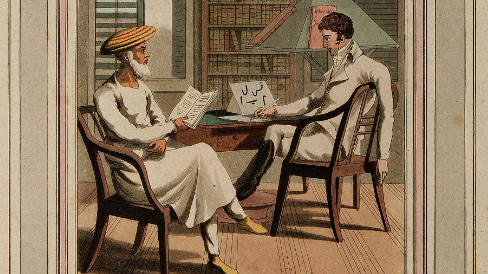 Cross-Cutting Research Themes
Cross-Cutting Research Themes
Our research fellows study British, German, and colonial history, with an emphasis on transnational, transregional, and comparative approaches, global entanglements, and legacies of empire. Cross-cutting themes include the history of knowledge, histories of gender and society, and new methods and sources expanding the institutional archive.
Cross-Cutting Research Theme
Concepts, Categories, and Orders of Knowledge

Our research focuses on the making of knowledge in its many forms, from the everyday to the scientific. We analyse the formation of concepts, categories, and orders across time, and follow the implementation and dissemination of such ideas in specific historical and cultural contexts. Questions of transnational transfers are especially pertinent —within and beyond our core geographical area of Britain and its colonies, following European, global, and (post-)imperial connections. We take an interest in the methodological implications of writing the history of knowledge across linguistic, national, and cultural boundaries. The institute thus serves as a meeting point for discussing methods in intellectual history and knowledge history emanating from both British and German traditions. We explore actors, practices, spaces, sites, and institutions of intellectual engagement, and the ways in which knowledge production has historically been disciplined. How have concepts, categories, and imagined orders shaped our perception of the world, stimulated both scientific and public discourses, and affected social cohesion? As such, concepts are not understood as mere representations of non-verbal ‘facts’, but as impacting socio-cultural settings and as pivotal modes of people’s ongoing self-reflection.
Related Projects:
Language Invention in the Age of Global English (Pascale Siegrist)
The Average Self: A Comparative History of Normality in the 20th Century (Clemens Villinger)
Sociological Objectivity as a Way of Life (Ole Münch)
Life in the Grid: Urban Nature in City Utopias, c. 1600–1750 (Mirjam Hähnle)
Preserving India’s Past: Law, Bureaucracy, and Historical Conservation in Colonial India 1904–1925 (Indra Sengupta)
Empire and Heritage in Light of the Decolonization Debate (Mirjam Brusius)
Cross-Cutting Research Theme
Gender and Society
![Student revolution 1967/68, West Berlin Black and white image of a group of students during the student revolution, 1967/68, West Berlin (Stiftung Haus der Geschichte, Ludwig Binder, [CC BY-SA 2.0])](https://www.ghil.ac.uk/fileadmin/_processed_/b/7/csm_Cross_Cutting_Kinship_16899874619_971d24b34f_o_c285141bb1.jpg)
Gender, as a multi-relational category, has always been a powerful indicator of social place, but also a social binding agent. How are men and women assigned a social place and ascribed power, individually or in groups? How are social hierarchies, inequalities, differences or support networks created by the production of gendered, intersectional identities? Our research explores the construction, contradictions, and consequences of social hierarchies and probes the intersection of gender with class, race, age, and other markers of power and identity. Attention will be paid to the role of experts and knowledge, to practices ‘from below’, and the negotiation and strengthening of norms by situative performances. This involves a dialogue with new methods and theories from other disciplines such as gender studies, queer studies, and social sciences. The projects draw on a variety of methods, including social data analysis, corpus linguistics, and concepts such as intersectionality, inequality, and the ‘doing’ of gender and other intersectional markers.
Related Projects:
Ageing and 'Doing Gender' in the Era of Value Change (Christina von Hodenberg)
Heavenly Hierarchies and Profane Prestige: Imagining and Shaping Social Order in Post-Roman England and the Frankish World (c. 400–850) (Stephan Bruhn)
International Standing Working Group on Medialization and Empowerment (Christina von Hodenberg and Jane Freeland)
Dwelling in Photography: Intimacy, Amateurism and the Camera in South Asia (Mallika Leuzinger)
Cross-Cutting Research Theme
Expanding the Archive: Revisiting Historical Sources and Methods

The archival repositories historians work with, and the methods they use to analyse their source base, have undergone significant changes in the past few decades. Increasing efforts are being made to reconstruct the history of groups which are historically under-documented in institutional archives, such as women, the poor and the aged, immigrants, or lower-caste and marginal community groups. Alternative sources and methods are being sought to supplement or challenge official records, not least in colonial, pre- and postcolonial settings or regions where formal archives are sparse or difficult to access. At the same time, historians are being confronted with a range of new, often still untested digital history- and artificial intelligence-led tools which promise the possibility of processing large corpora of sources. Our projects focus on the analysis or re-analysis of diverse sources, such as social science-generated data, quantitative databases, websites and social media, oral history interviews, visual sources such as photographs, vernacular tourist brochures, serial data, and material objects. We engage critically with questions of method, theory, power, digital history, and archival practice in this regard.
Related Projects:
Archival Imaginaries and the Politics of History in South Asia (Mallika Leuzinger)
Selling History: Tourist Guides, Bazaar Histories, and the Politics of the Past in India in the late 20th and early 21st Centuries (Indra Sengupta)
The Social History of Naturalized British Subjects – a Prosopographical Approach (Markus Mösslang)
Ageing and 'Doing Gender' in the Era of Value Change (Christina von Hodenberg)
Writing Contemporary History with Social Data: Plans for a Digital Infrastructure (Christina von Hodenberg)
Sociological Objectivity as a Way of Life (Ole Münch)
ICAS:MP Thematic Consolidation Group ‘Constructing Alternative Pasts: (New) Sources and Methods’ (2024–2027)
The Average Self: A Comparative History of Normality in the 20th Century (Clemens Villinger)
Empire and Heritage in Light of the Decolonization Debate and The Spaces of Photography (Mirjam Brusius)